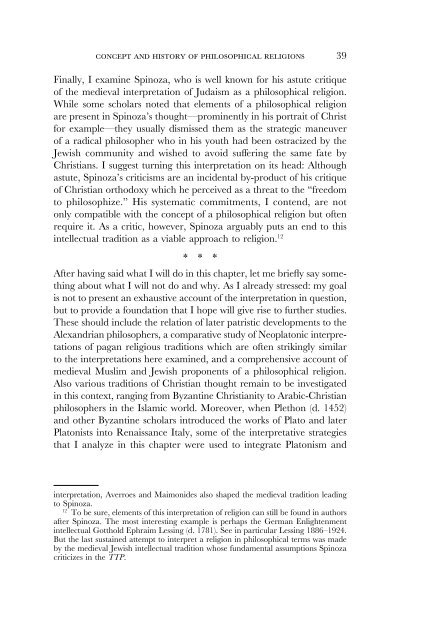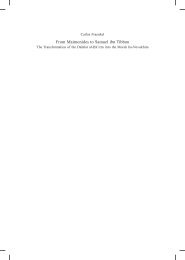Download PDF - Carlos F. Fraenkel
Download PDF - Carlos F. Fraenkel
Download PDF - Carlos F. Fraenkel
Create successful ePaper yourself
Turn your PDF publications into a flip-book with our unique Google optimized e-Paper software.
concept and history of philosophical religions 39Finally, I examine Spinoza, who is well known for his astute critiqueof the medieval interpretation of Judaism as a philosophical religion.While some scholars noted that elements of a philosophical religionare present in Spinoza’s thought—prominently in his portrait of Christfor example—they usually dismissed them as the strategic maneuverof a radical philosopher who in his youth had been ostracized by theJewish community and wished to avoid suffering the same fate byChristians. I suggest turning this interpretation on its head: Althoughastute, Spinoza’s criticisms are an incidental by-product of his critiqueof Christian orthodoxy which he perceived as a threat to the “freedomto philosophize.” His systematic commitments, I contend, are notonly compatible with the concept of a philosophical religion but oftenrequire it. As a critic, however, Spinoza arguably puts an end to thisintellectual tradition as a viable approach to religion. 12* * *After having said what I will do in this chapter, let me briefly say somethingabout what I will not do and why. As I already stressed: my goalis not to present an exhaustive account of the interpretation in question,but to provide a foundation that I hope will give rise to further studies.These should include the relation of later patristic developments to theAlexandrian philosophers, a comparative study of Neoplatonic interpretationsof pagan religious traditions which are often strikingly similarto the interpretations here examined, and a comprehensive account ofmedieval Muslim and Jewish proponents of a philosophical religion.Also various traditions of Christian thought remain to be investigatedin this context, ranging from Byzantine Christianity to Arabic-Christianphilosophers in the Islamic world. Moreover, when Plethon (d. 1452)and other Byzantine scholars introduced the works of Plato and laterPlatonists into Renaissance Italy, some of the interpretative strategiesthat I analyze in this chapter were used to integrate Platonism andinterpretation, Averroes and Maimonides also shaped the medieval tradition leadingto Spinoza.12To be sure, elements of this interpretation of religion can still be found in authorsafter Spinoza. The most interesting example is perhaps the German Enlightenmentintellectual Gotthold Ephraim Lessing (d. 1781). See in particular Lessing 1886–1924.But the last sustained attempt to interpret a religion in philosophical terms was madeby the medieval Jewish intellectual tradition whose fundamental assumptions Spinozacriticizes in the TTP.



